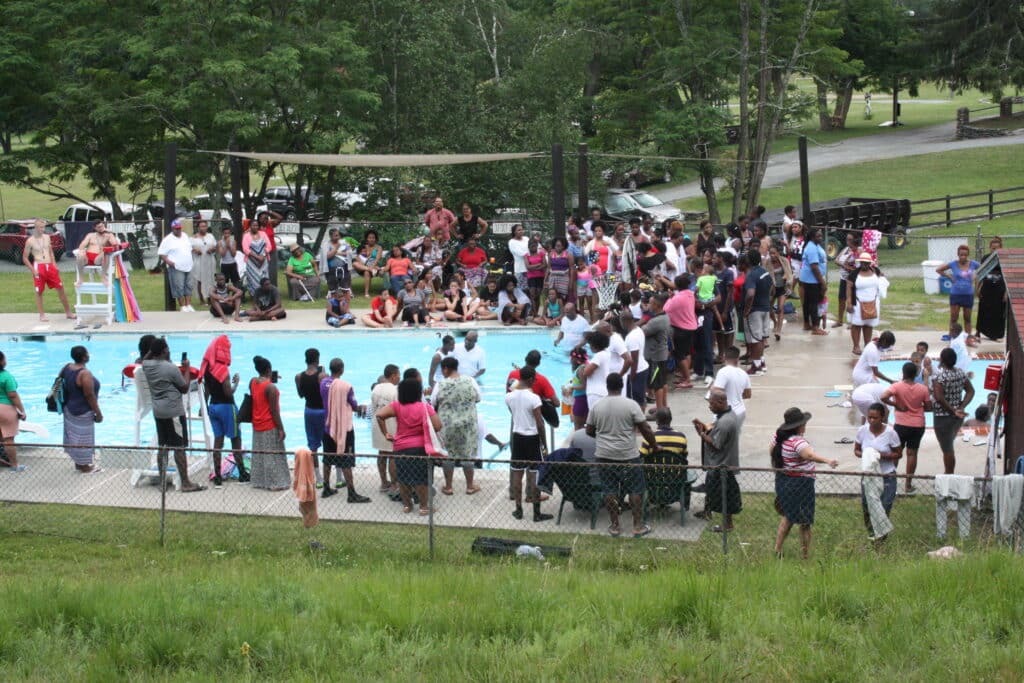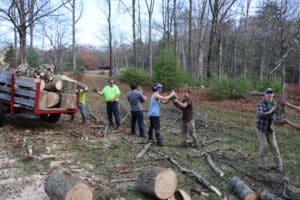Garifuna Baptism
It’s the year 2000. I am 16. I’m so nervous. The concrete around the Camp Deerpark pool scorches the bottoms of my feet as I stand in line, waiting my turn for the plunge. I hear drums in the background, thundering to the rhythm of my heartbeat. The women are singing in high-pitched voices. I tiptoe into the water and reach for my father’s hand. He baptizes me, en el Nombre del Padre, del Hijo, y del Espiritu Santo … Amen! As I am sub-merged, all I can think is . . . this water is so cold.
Our culture and language is called Garifuna. It has always been a blessing that we can live out our faith within our cultural context when we are at Camp Deerpark. Growing up in New York City, people were not always so understanding. I remember my friends thinking that Garifuna was a culture I had concocted, just for the sake of being unique. It confused some people when they saw a black girl, fluent in Spanish, claiming to be from Honduras, but with African roots, and speaking another language that sounded like . . .who knows what?
However, I looked forward to summers at Camp Deerpark, where I and members of the Garifuna Church in the Bronx could just be ourselves. It was home, because we were welcomed to make ourselves at home . . . and we did (and still do)! Of course, camp isn’t anything like Honduras, but there is always that sense of belonging.
At camp, our culture is not just accommodated; it is celebrated. Sometimes we come up to camp and put up a piñata under a tree. The churchwomen screech like schoolgirls as they set up the Maripol (Maypole) dance with ribbons around the volleyball pitch. We are always extra happy when the kitchen staff makes us beans and tortillas because it reminds us of Baleadas from home. And when our churches come to Camp Deerpark, you can count on hearing our Garaoun (traditional drums) resounding our rhythms loudly from the poolside, campfire sites and through the chapel walls. Our rich culture infiltrates everything we do. It is who we are; and we are proud of it.
I am now 33. I call the name of the next youth in line, as she nervously awaits her turn. She tiptoes to the edge of the pool and with a shiver, she reaches for my hand. I walk her over to my father, and just like he did with me years ago, he baptizes her in the Name of the Father, the Son, and Holy Spirit . . . Amen! The water is cold, but we are not in the Camp Deerpark pool. This time around, we are across the globe, in Kenya.
It is an honor to live in a continent where the Garifuna culture is rooted. Every time my parents visit, I hear my mother say for the millionth time, “This is just like Honduras!” I chuckle. Soon, I will return the visit to New York. While there, it’s a must that I visit my most favorite place in the world. I rest assured, knowing that there is a place upstate that reminds us all of home, even when we are very far from it. There is a place, nestled in the mountains and in our hearts, where we can eat, dance, sing and share in languages other than English and traditions rooted in faraway lands. It is Camp Deerpark . . . a place where we will always belong.
Celmali Jaime Okonji, program director in 2006–7, attended Evangelical Garifuna Church and King of Glory Tabernacle, both in the Bronx.
Related Entries
Share:
Come and Pray Lunch & Retreat
Come and PrayPrayer Day with Lunch March 14, 9am-3pm~$30~ Overnight Prayer RetreatMarch 13-14includes March 14 Lunch~$120~ Come seek the Lord’s face with your faith family from all over the Tristate region for a relaxing time of prayer and discussion. We know God is doing amazing things — and he will continue to do more as…
Time to Pray
As followers of Jesus, he is our example in everything. When Camp says in our mission statement that we are “a community of Christ” – this is what we’re saying: we’re a group of people dedicated to the purpose of following and being like Jesus. So the question is, how do we follow Jesus as…
A Place of Prayer
Prayer — especially “vertical prayer” for specific God-revealed mission set apart from the concerns of our life and ministry — is a major theme for Camp in 2026. Maybe you read about this in the Winter Newsletter article “Time to Pray“? We want to extend the invitation to the entire Camp community and beyond —…
Living Abundantly Retreat
Jesus promised his followers an abundant life. Is that just an abstract idea to distract us from earthly misery, or is there real power in Christ to live a full and rich life in the here and now? Young adults are navigating a challenging landscape as they start “adulting” and building a life, so we’ll…
Forgiving Debts: 2025 Woodcutting Season
When Jesus taught his disciples to pray (Mt 6:9-15), he described two big realities where “thy Kingdom Come, thy will be done on Earth as it is in Heaven” are realized in the human world: First, he said “give us this day our daily bread”, acknowledging that God’s provision for human need is a central…
“How Do I Donate?”
Recently, a thirteen-year-old guest at Camp asked Operations Director Kevin Smith, “how do I donate?” Kevin was honestly a little surprised, but was happy to see this young member – who was on retreat with one of our owning churches — taking some initiative. Kevin directed him to the website Donate page, and the young…
The Discipleship Down-Low
Defining Discipleship 18 And Jesus came and said to them, “All authority in heaven and on earth has been given to me. 19 Go therefore and make disciples of all nations, baptizing them in the name of the Father and of the Son and of the Holy Spirit, 20 teaching them to observe all that I have commanded…
The Virtuous Wife
This past weekend, Camp hosted three women’s retreats at Camp. Though the retreat groups were very diverse in background – one was from an urban church plant in Philadelphia, one was from a Garifuna Mennonite church in Brooklyn (an Afro-Caribbean Culture), and one was from a multi-ethnic faith community reaching out in North Jersey. Though…
A Life of Service
I believe the most important thing to God is not our personality, knowledge, or talents, but our availability. How willing and ready are we to respond when He calls, and how ready are we to do what He says? What use to the Lord are people who could do what he wants with excellence and…
Building Belonging
At our February NYC LMC District meeting, we’re discussing the Belonging phase of The Journey Map. In this first phase on the map, individuals and groups on a spiritual journey begin the process of connecting to each other and evaluating the place they may have in each other’s lives. Have you ever been an outsider…




